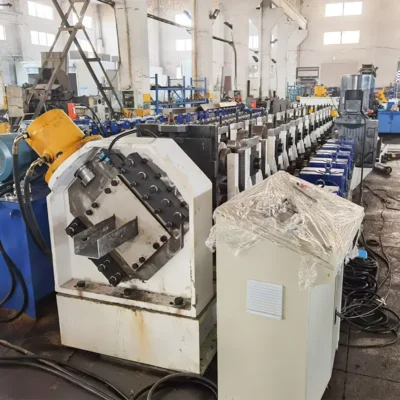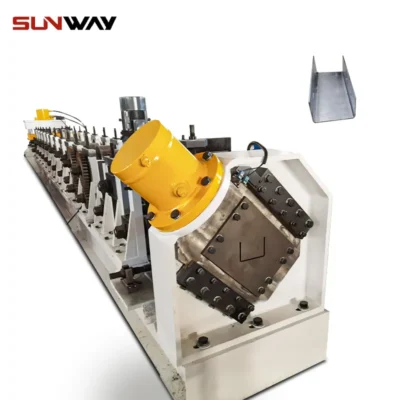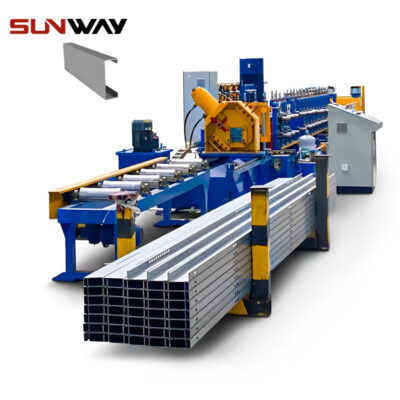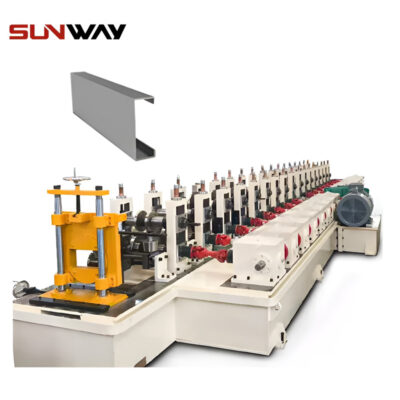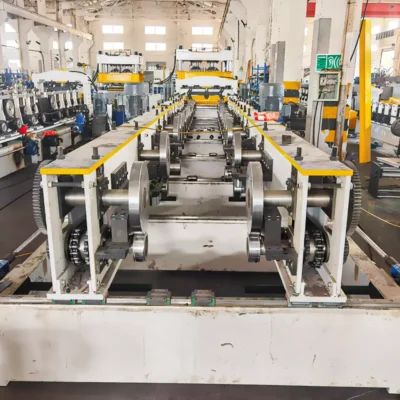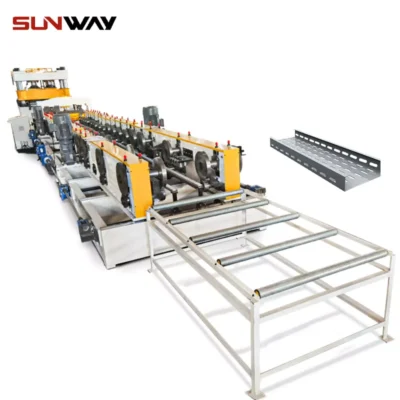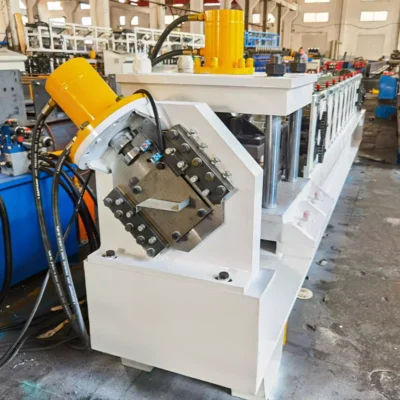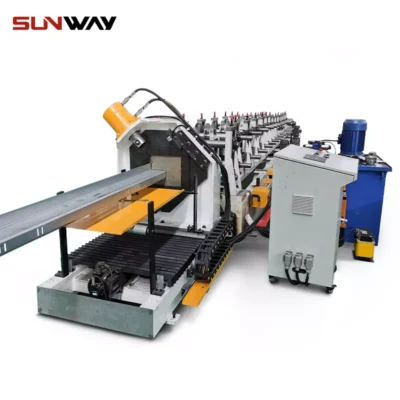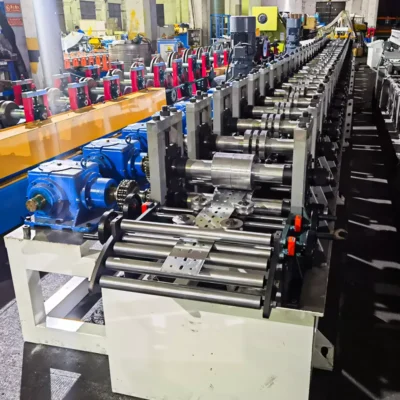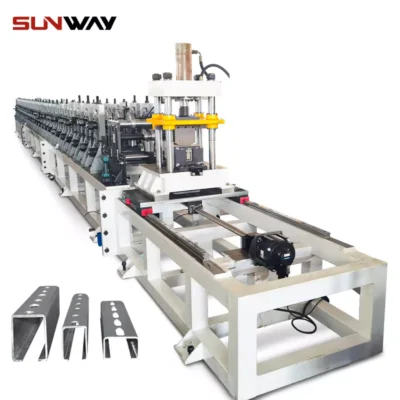The automotive industry is constantly evolving to meet the demands of lightweighting, aerodynamics, and cost-efficiency. At the core of this transformation lies Car Body Panel Roll Forming Machines, which have become indispensable in the production of precision-engineered car body panels. These machines enable manufacturers to produce high-quality, durable, and customizable panels at scale, meeting the stringent standards of modern automotive design.
In this article, we’ll explore Car Body Panel Roll Forming Machines, delving into their features, applications, technological advancements, benefits, pricing, and the reasons why Wuxi Sunway Machinery leads the industry. Whether you are an automotive manufacturer, parts supplier, or a technology enthusiast, this guide will give you in-depth knowledge about how these machines are shaping the future of car manufacturing.
What is a Car Body Panel Roll Forming Machine?
A Car Body Panel Roll Forming Machine is an advanced industrial machine designed to produce metal panels used in the construction of car bodies. These panels include door panels, roof panels, hoods, fenders, and side panels, among others. The roll-forming process transforms coiled metal sheets into specific shapes and profiles required for automotive design.
The machine uses a series of rollers to gradually shape the metal into the desired profile, ensuring high precision and consistency. Modern machines also come equipped with features like embossing, cutting, and punching to create complex designs and functional components in a single production line.
With the automotive industry focusing on lightweight materials and fuel efficiency, Car Body Panel Roll Forming Machines play a crucial role in producing panels that are not only lightweight but also strong enough to meet safety standards.
Applications of Car Body Panels
Car body panels are integral to both the structural integrity and aesthetic appeal of vehicles. Here are some key applications:
1. Door Panels
- Use Case: Outer and inner door panels are essential for vehicle entry points.
- Why It Matters: These panels must balance lightweight construction with durability to withstand frequent use and impact.
2. Roof Panels
- Use Case: Roof panels provide structural support to the vehicle while protecting passengers from external elements.
- Why It Matters: High-precision roll-forming ensures smooth surfaces for aerodynamic performance and aesthetic appeal.
3. Hood Panels
- Use Case: Hoods cover the engine compartment, requiring durability and heat resistance.
- Why It Matters: Modern roll-forming machines ensure uniformity and compatibility with hinges and locking mechanisms.
4. Fender Panels
- Use Case: Fenders protect the wheels and undercarriage from debris and enhance the vehicle’s aerodynamics.
- Why It Matters: Precise shaping minimizes drag and improves overall fuel efficiency.
5. Side Panels
- Use Case: Side panels form the external walls of the car body, contributing to its structural integrity and design.
- Why It Matters: Roll-formed panels ensure consistency and compatibility with other components.
6. Tailgate and Trunk Panels
- Use Case: Panels for tailgates and trunks must be lightweight yet sturdy enough to support frequent opening and closing.
- Why It Matters: High-quality roll-forming ensures durability without adding unnecessary weight.
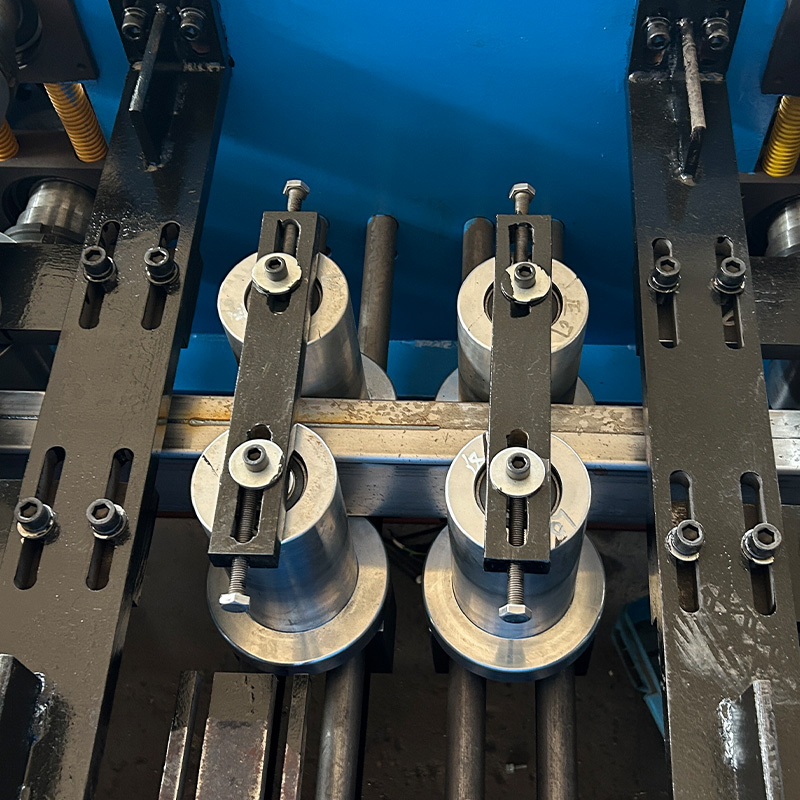
Key Features of Wuxi Sunway Car Body Panel Roll Forming Machines
When it comes to manufacturing car body panels, Wuxi Sunway Machinery offers cutting-edge roll-forming solutions that are tailored to the needs of the automotive industry. Here’s what makes their machines stand out:
1. High-Precision Forming
- What It Does: Achieves tight tolerances and smooth finishes required for car body panels.
- Why It’s Important: Ensures compatibility with other vehicle components and enhances aesthetic appeal.
2. Material Compatibility
- Supported Materials:
- Aluminum alloys
- High-strength steel (HSS)
- Galvanized steel
- Stainless steel
- Cold-rolled steel
- Why It’s Crucial: Allows manufacturers to produce lightweight panels without compromising on strength or durability.
3. Multi-Profile Capabilities
- What It Offers: Produces a variety of panel profiles, from flat to embossed and contoured designs.
- Why It’s Revolutionary: Supports the production of diverse car models and designs.
4. Integrated Cutting and Punching Systems
- Features: Servo-driven cutting systems ensure precise panel lengths, while punching units create holes for assembly components.
- Why It’s Important: Streamlines the production process, reducing the need for secondary operations.
5. High-Speed Production
- Performance: Capable of producing up to 15 panels per minute, depending on the complexity of the design.
- Why It Matters: Increases productivity to meet the high demands of automotive manufacturing.
6. PLC-Controlled Automation
- Features:
- Fully programmable logic controllers (PLC) with a user-friendly touchscreen interface.
- Stores multiple panel designs and production parameters.
- Real-time monitoring and error detection.
- Why It’s Revolutionary: Simplifies operation and ensures consistent quality across production runs.
7. Compact and Modular Design
- What It Does: Offers a space-efficient design that integrates seamlessly into existing production lines.
- Why It Matters: Optimizes factory floor space while allowing for future upgrades.
8. Enhanced Safety Features
- Highlights:
- Emergency stop buttons for immediate shutdown.
- Overload protection to prevent mechanical damage.
- Safety shields for moving parts to protect operators.
- Why It’s Critical: Ensures a safe working environment without compromising productivity.
Production Workflow of a Car Body Panel Roll Forming Machine
The production process for car body panels involves several precise steps to ensure quality and efficiency. Here’s an overview of the workflow:
1. Decoiling
- Raw metal coils are loaded onto the decoiler, which feeds the material into the machine.
2. Leveling
- A leveling system ensures the material is flat and free from warping before entering the roll-forming section.
3. Roll Forming
- The material passes through a series of rollers that gradually shape it into the required panel profile.
4. Punching and Embossing
- Hydraulic or servo-driven punching units create holes or embossments for assembly and aesthetic purposes.
5. Cutting
- Servo-controlled cutting systems trim the panels to the specified lengths with precision.
6. Stacking
- Finished panels are automatically stacked for easy packaging and transportation.
Pricing of Car Body Panel Roll Forming Machines
The cost of a Car Body Panel Roll Forming Machine depends on its features, production capacity, and customization level. Below is a general pricing guide for 2025:
| Machine Type | Capabilities | Price Range (USD) |
|---|---|---|
| Basic Machines | Standard car body panel production | $120,000–$180,000 |
| High-Speed Machines | Enhanced speed and precision | $180,000–$250,000 |
| Fully Customizable Machines | Advanced features and multi-profile capability | $250,000–$350,000 |
For tailored pricing and financing options, contact Wuxi Sunway Machinery.
Advantages of Using a Car Body Panel Roll Forming Machine
Investing in a Car Body Panel Roll Forming Machine offers numerous benefits for automotive manufacturers:
1. Enhanced Efficiency
- High-speed production reduces lead times and operational costs.
2. Precision and Consistency
- Ensures uniform quality across all panels, minimizing defects.
3. Material Versatility
- Supports the use of lightweight materials, contributing to fuel efficiency and sustainability.
4. Cost Savings
- Reduces material waste and labor costs, improving overall profitability.
5. Scalability
- High production capacity allows manufacturers to meet growing demands for new car models.
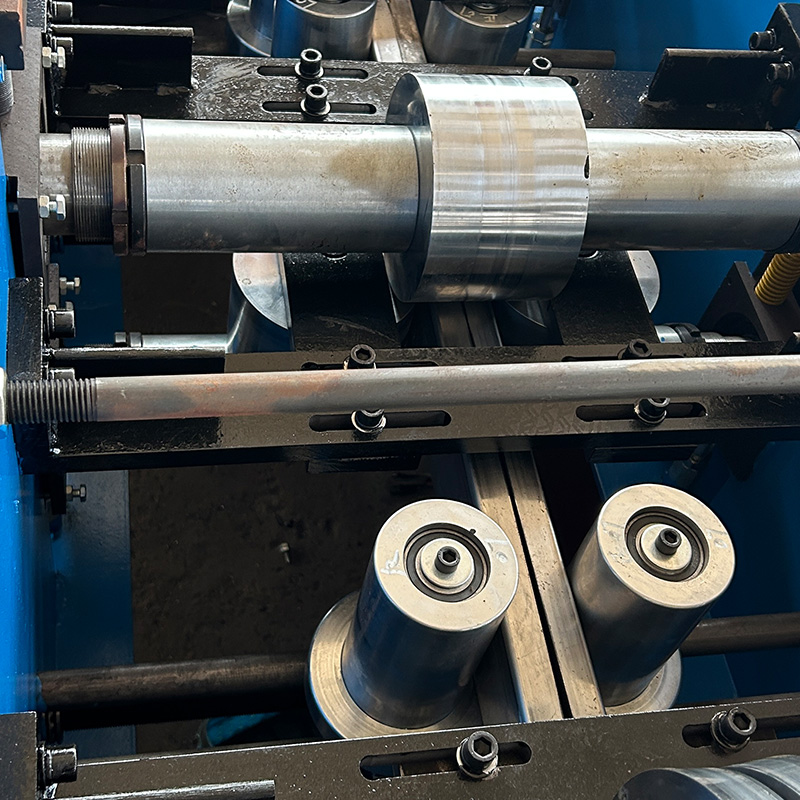
FAQs About Car Body Panel Roll Forming Machines
| Question | Answer |
|---|---|
| What is the production speed? | Machines can produce up to 15 panels per minute, depending on the design complexity. |
| Can the machine handle lightweight alloys? | Yes, it supports aluminum and other lightweight materials for vehicle lightweighting. |
| What is the material thickness range? | Compatible with thicknesses ranging from 0.5mm to 2.5mm. |
| Is training included with the purchase? | Yes, comprehensive training is provided with every machine purchase. |
| What is the warranty period? | All Sunway machines come with a 12-month warranty, with extended options available. |
| Does Sunway provide after-sales support? | Absolutely! Sunway offers full technical support, including spare parts and troubleshooting. |
Global Trends Driving the Adoption of Car Body Panel Roll Forming Machines
The automotive industry is undergoing a significant transformation, driven by electrification, safety standards, and sustainability. These trends are pushing manufacturers to adopt Car Body Panel Roll Forming Machines to remain competitive in a rapidly evolving market. Here are the top global trends shaping the demand for these machines in 2025:
1. Surge in Electric Vehicle (EV) Production
- The Numbers: Global electric vehicle sales are expected to surpass 50 million units annually by 2030, with a compound annual growth rate (CAGR) of over 20%.
- Impact on Car Body Panels: EVs require lightweight materials like aluminum and high-strength steel to offset battery weight and improve efficiency.
- Why It Matters: Advanced roll-forming machines can process lightweight materials with precision, making them essential for EV manufacturing.
2. Increasing Demand for Lightweighting
- The Context: Automakers are prioritizing lightweight designs to improve fuel efficiency and reduce carbon emissions in compliance with international regulations.
- Impact on Roll-Forming Machines: The ability to produce lightweight and high-strength panels gives roll-forming machines a critical role in modern automotive manufacturing.
- Why It’s Important: Lightweighting is not just a trend; it’s a necessity for meeting emission reduction targets.
3. Rising Safety and Crashworthiness Standards
- The Trend: Governments worldwide are imposing stricter safety regulations, requiring cars to have enhanced crash-resistant features.
- Impact on Car Body Panels: Structural panels must be designed to absorb impact energy while maintaining structural integrity.
- Machine Relevance: Roll-forming machines deliver the precision and strength needed to produce panels that meet these rigorous safety standards.
4. Growth of Customization in Automotive Design
- What’s Happening: Consumers increasingly demand personalized vehicles with unique designs and features.
- Impact on Panel Production: Manufacturers must produce custom profiles and designs at scale.
- Why It’s Exciting: Roll-forming machines with multi-profile capabilities make it easier to meet diverse design requirements.
5. Focus on Green Manufacturing
- The Shift: Automakers are adopting sustainable production methods to reduce waste and energy consumption.
- Impact on Roll-Forming Machines: Machines that minimize material waste and energy use are gaining traction.
- Why It Matters: Wuxi Sunway’s eco-friendly roll-forming machines align perfectly with the green goals of the automotive industry.
Technological Advancements in Car Body Panel Roll Forming Machines
The evolution of Car Body Panel Roll Forming Machines is driven by cutting-edge technologies that enhance speed, precision, and sustainability. Let’s explore some of the latest advancements:
1. Artificial Intelligence (AI) Integration
- What It Does: AI algorithms analyze production data to optimize machine performance and detect defects in real-time.
- Benefits:
- Reduces downtime by predicting maintenance needs.
- Enhances quality control, ensuring defect-free panels.
- Improves operational efficiency by identifying bottlenecks.
2. IoT-Enabled Smart Machines
- How It Works: IoT sensors connect the machine to a centralized platform for remote monitoring and diagnostics.
- Advantages:
- Allows manufacturers to track production metrics in real time.
- Enables remote troubleshooting and updates.
- Reduces the need for on-site technical interventions.
3. Hybrid Material Processing
- What It Offers: Machines can process multiple materials, such as aluminum and high-strength steel, in a single production line.
- Why It’s Revolutionary: Expands the machine’s versatility, making it suitable for hybrid vehicle designs and multi-material assemblies.
4. Servo-Driven Forming and Cutting
- The Technology: High-speed servo motors control the roll-forming and cutting processes with unparalleled precision.
- Benefits:
- Delivers burr-free edges and accurate hole placement.
- Enhances the aesthetic quality of panels.
- Reduces material waste, improving cost efficiency.
5. Digital Twin Technology
- What It Is: A virtual replica of the machine that simulates production processes and tests new panel designs.
- Why It’s Transformative:
- Speeds up prototyping without wasting materials.
- Identifies potential issues before they impact production.
- Facilitates faster time-to-market for new car models.
6. Multi-Profile Flexibility
- What It Does: Allows manufacturers to switch between different panel profiles without manual adjustments.
- Why It Matters: Supports the production of diverse car models, from sedans to SUVs, without interrupting the production line.
Environmental Benefits of Car Body Panel Roll Forming Machines
Sustainability is no longer an option—it’s a requirement for automakers. Here’s how Car Body Panel Roll Forming Machines contribute to eco-friendly manufacturing:
1. Material Efficiency
- What It Does: Optimizes material usage, minimizing scrap and waste.
- Why It Matters: Reduces raw material costs and environmental impact.
2. Energy-Efficient Operations
- The Innovation: Modern machines are equipped with energy-efficient motors and systems.
- Impact: Lowers electricity consumption during production, supporting green manufacturing practices.
3. Recyclable Outputs
- The Advantage: Panels produced from aluminum and steel are 100% recyclable.
- Why It’s Important: Encourages a circular economy by reducing landfill waste.
4. Localized Production
- How It Helps: Enables manufacturers to produce panels locally, reducing the environmental footprint associated with transportation.
- Outcome: Supports regional economies and sustainability initiatives.
Comparison: Car Body Panel Roll Forming Machines vs. Traditional Methods
Let’s compare Car Body Panel Roll Forming Machines with conventional methods, such as manual stamping or extrusion:
| Feature | Roll Forming Machine | Traditional Methods |
|---|---|---|
| Precision | High; ensures consistent dimensions | Moderate; prone to human or mechanical errors |
| Production Speed | High; up to 15 panels per minute | Slow; labor-intensive processes |
| Automation | Fully automated with AI and IoT integration | Mostly manual or semi-automated |
| Material Waste | Minimal; optimized processes reduce scrap | Higher; less efficient material usage |
| Customization | Easily customizable for various designs | Limited flexibility; requires separate tooling |
| Cost Efficiency | Higher initial cost, lower operational costs | Lower initial cost, higher long-term costs |
| Scalability | Ideal for mass production | Not suitable for high-volume manufacturing |
Additional FAQs About Car Body Panel Roll Forming Machines
| Question | Answer |
|---|---|
| What is the typical lead time for delivery? | Depending on customization, delivery takes 3–6 months. |
| Can the machine handle ultra-thin materials? | Yes, it can process materials as thin as 0.5mm. |
| What is the machine’s lifespan? | With proper maintenance, the machine can last 10–15 years or more. |
| Is remote technical support available? | Absolutely! Wuxi Sunway offers IoT-enabled remote diagnostics and support. |
| What is the maximum material thickness? | The machine can handle materials up to 2.5mm thick, depending on the design. |
| Can Sunway customize the machine for specific needs? | Yes, Wuxi Sunway specializes in tailoring machines to meet unique production requirements. |
Why Choose Wuxi Sunway Machinery for Car Body Panel Roll Forming Machines?
Here’s why Wuxi Sunway Machinery is the global leader in roll-forming technology for the automotive industry:
- Proven Expertise: Decades of experience in delivering innovative roll-forming solutions.
- Global Reach: Trusted by automotive manufacturers worldwide.
- Customization: Machines tailored to meet specific production needs and design requirements.
- Sustainability: Eco-friendly designs to minimize waste and support green manufacturing.
- Innovation: Cutting-edge technologies, including IoT integration and servo-driven systems.
- Comprehensive Support: From installation to troubleshooting, Sunway ensures seamless operations.
Conclusion: Driving Automotive Innovation with Roll Forming
The Car Body Panel Roll Forming Machine represents the future of automotive manufacturing, enabling precision, efficiency, and sustainability. Whether you’re producing lightweight panels for EVs or crash-resistant components for SUVs, these machines are essential for staying ahead in a competitive market.
Ready to transform your automotive production line? Contact Wuxi Sunway Machinery today to explore their advanced roll-forming solutions. Together, let’s drive automotive innovation—one panel at a time!

